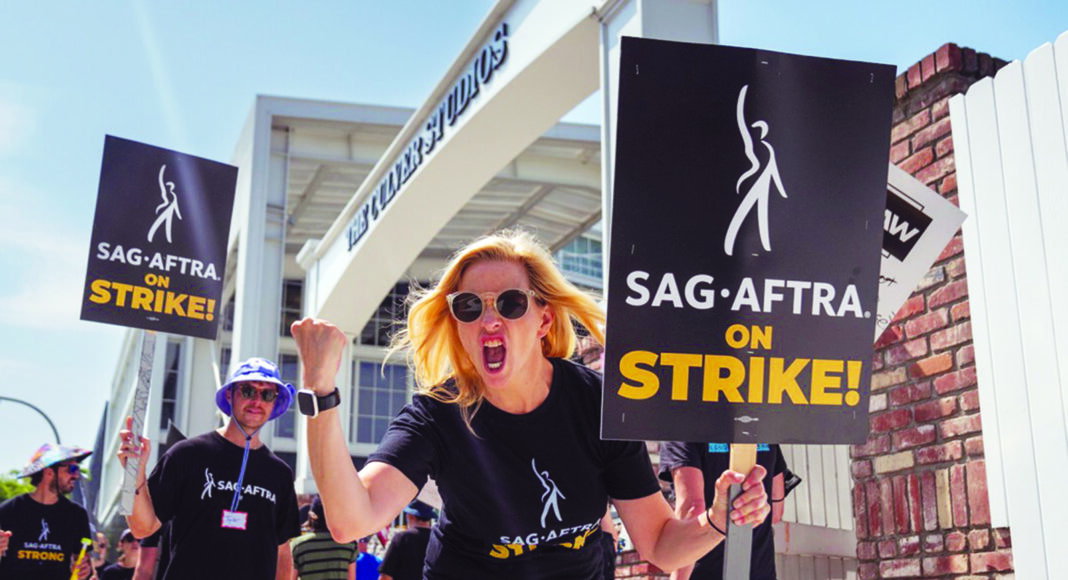With the Writers Guild of America and the Screen Actors Guild on strike, Hollywood has shut down. As workers demand fair compensation and regulation over the use of artificial intelligence, college students hoping to break into the entertainment industry are caught up in the historic moment.
UC Santa Cruz third-year student Tieran Harvey aspires to be a Writers Guild member working in writers’ rooms in the future. This summer Harvey is interning for an independent film currently in pre-production, a project allowed to continue since the film’s production company doesn’t have a contract with a major film studio impacted by the strike. Although she is not allowed to be in contact with any actors and scriptwriters due to the strike, she is able to continue her work in production.
She said she’s grateful these strikes are happening before she graduates and that the negotiations are giving her inspiration to be a stronger advocate for industry professionals.
“I just want to support and be an ally, because people deserve to be paid their worth,” Harvey said.
She said the strikes made her lose a sense of romance about the industry, seeing how many people are struggling to make a living wage.
“It really made me realize that not everyone is rooting for you,” Harvey said. “We go into acting knowing there’s risks and knowing it’s hard to be successful, but we don’t want to be on the street because we’re pursuing a career.”
When the Writers Guild of America strike started May 2, midway through Teddy Alvarez-Nissen’s internship for a production company in Burbank, fewer scripts started coming in and his work as a reader slowed. As the strike went on, the third-year film student at the University of Southern California became curious about the specific terms that were being negotiated. When he looked at the fine print, he discovered the union was fighting for what was, in his mind, the bare minimum—standards he thought were already in place.
“That does scare me as somebody going into the industry,” said Alvarez-Nissen, who’s graduating in 2025. “I think we’ve all known about the stereotype of the studio that takes advantage of people or the producers that just want to get as much money as possible. It’s an illustration of how much worse the problem is than we thought it was and why it is important to be striking.”
Fighting for increased compensation and regulation over the use of artificial intelligence, both unions representing writers and actors are on strike for the first time in 63 years, effectively shutting down much of the entertainment industry.
Internships and fellowships at major production companies are on pause and current negotiations are exposing wide pay disparities in the cutthroat world of entertainment. But there’s a silver lining for some students, who hope the strikes will lay the foundation for better work conditions in the future.
“Even if the strike makes it more difficult for me to do an internship and find work out of college and start my career, I think that’s very miniscule compared to the benefits of a successful strike and getting those terms met,” Alvarez-Nissen said.
Students expect livable wages once they head into the industry but the rise of streaming services, which often produce shorter seasons and have different compensation structures, already have workers struggling. Unregulated artificial intelligence has writers and actors worried that it will eliminate valued positions from writers rooms and background roles.
Stephen Galloway, Dean of Chapman University’s Dodge College of Film and Media Arts, said the strikes come at a time when the industry is already laying off thousands and freezing hiring for recent college graduates.
“It’s not just people who want to write or be actors. It’s all the people who service them—management, marketing, publicity, accounting and catering companies,” Galloway said. “There’s this extraordinary ripple effect for all these companies who hire young people.”
Some of the Writers Guild’s main demands include regulating artificial intelligence in writers rooms. Additionally, part of the Actors Guild’s demands include establishing provisions protecting human-created work and requiring consent and compensation when a performer’s voice, likeness or performance is used or changed using artificial intelligence.
Franz Kurfess, a computer science professor at Cal Poly San Luis Obispo, said that while artificial intelligence may be used as a tool for writers, it might also replace them.
“The danger in my view is that the tasks of writers will not be completely eliminated, but the amount of work that is available for writers will be less and the tasks that they are expected to do will also shift to some degree,” said Kurfess. “Given that there most likely will be fewer opportunities, there will be some writers who essentially will lose their job.”
Student Alvarez-Nissen said he’s used artificial intelligence software before with creative projects. In a scene he filmed with a room full of paintings, he plugged a prompt into Midjourney and created the artwork he needed. Previously he would have paid someone to paint it for him, so artificial intelligence eliminated an expense he needed for his small school project.
While it helped him in that case, Alavarez-Nissen says billion-dollar studios also think the same way the broke college filmmaker does: if there’s any possible avenue to save money, they’re going to take it.
“A reason that this strike is so important is because they’re addressing AI so vehemently,” Alvarez-Nissen said. “If they lose this battle, that trickles down to almost everybody who works in the industry.”
This story and other higher education coverage are supported by the College Futures Foundation.













